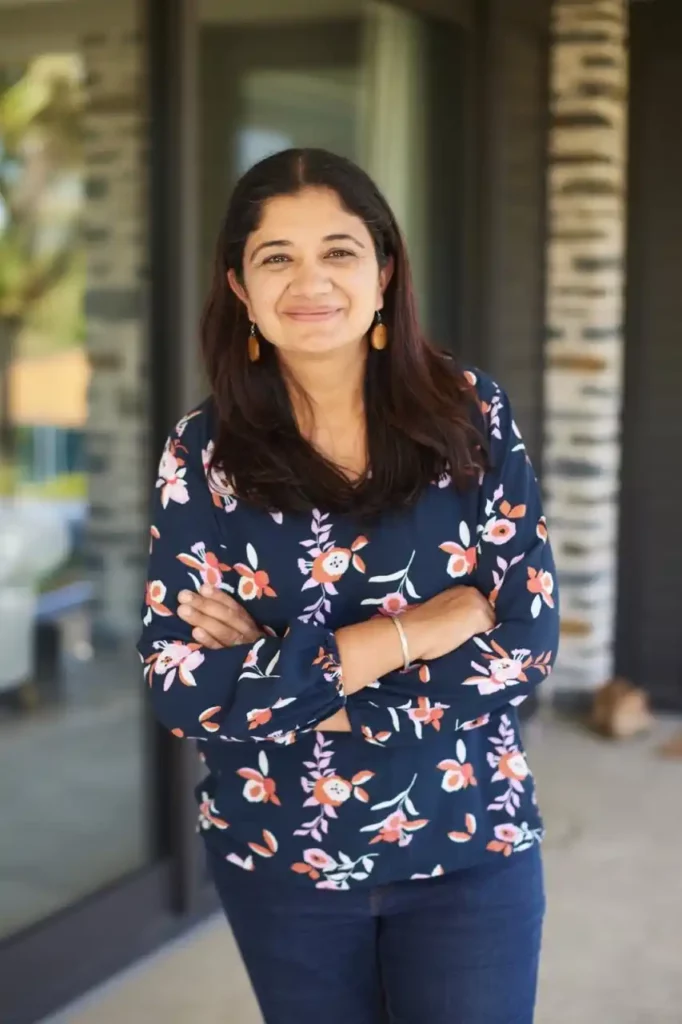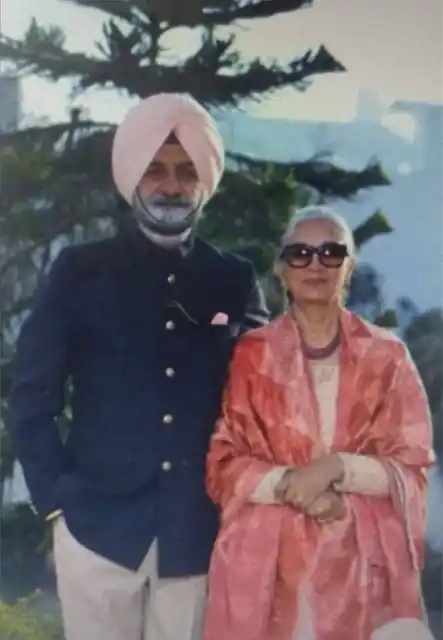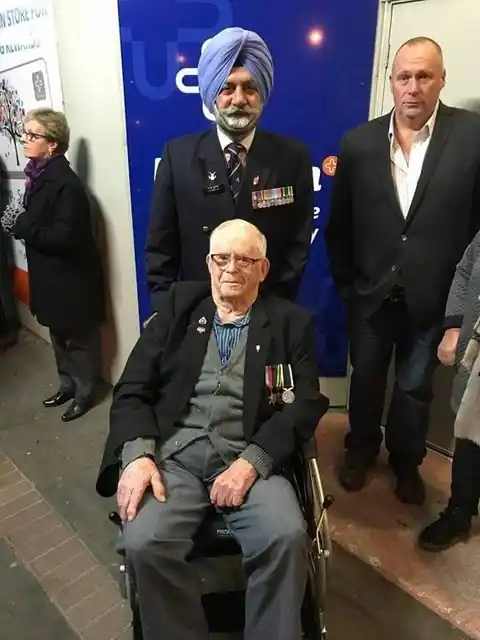
Kiwi activist, scholar, mum, farmer and, most recently, councillor for Southland, Jaspreet Boparai has lived with her young family in New Zealand for 14 years, and, having relinquished her Indian citizenship in 2017, has no plans to leave any time soon.
Born to a Sikh family in Ferozepur in the Indian region of Punjab on the north-western border between India and Pakistan, Jaspreet described her childhood as ‘very, very happy’.
Her mother, Mrs J S Dullat, worked as a teacher, and her father, Lt. Col (retd) Dullat, was an infantryman in the Indian Army, a ‘foot soldier’ who during his career was posted to numerous locations around India, the China and Pakistan border. He also served in Somalia as part of a 5000-strong Indian peacekeeping force for the United Nations (UN).

Depending on his posting, Jaspreet’s father could be away from the family for long periods of time, in volatile areas where it wasn’t possible for the family to accompany him.
Despite his absence, Jaspreet and her younger brother enjoyed a typical, happy childhood, living in small, country communities, and it was this upbringing that eventually made rural New Zealand an attractive prospect.
Jaspreet had what she described as very ordinary, government schooling in India. It was no elite education that saw her earn degrees in both English Literature and Accounting, along with gold medallist status at university, but rather, a natural gift for learning, diligence and the good work ethic instilled by her parents.
The family’s heritage is agrarian. The minority Sikh community punches well above its weight; despite representing just 1.7% of India’s population, the Punjab region produces around 16% of the country’s wheat, from just over 1.5% of its land.
The Sikh community also provides something in the region of 10% of the military force. Jaspreet said, “When you meet a Punjabi Sikh, the question is: ‘Do you fight, or do you farm’?”
Joining the army is viewed as an honourable profession across India, a country where division between people on the basis of religious affiliation is both long-standing and pervasive.
It also provides a unique environment in which people who may otherwise hold prejudice towards each other are able to put their differences aside for the sake of a united goal to defend their country.
“I’ve grown up to be very, very colour blind,” said Jaspreet. “My dad would say, ‘I decide my squad on the basis of their ability and suitability for the task. Whether they are this religion, or that religion… it doesn’t come into it”.
Retiring from the army with the rank of Lieutenant Colonel, Jaspreet’s father imparted a deep sense of humanity to his children, and demonstrated intense patriotism. Jaspreet recalls watching weekend movies together as a family—if the national anthem came on to begin the film—her father would insist they all got on their feet to sing along.
Local television news often showed footage of army funerals; coffins draped in India’s tri-colour flag. If Jaspreet’s father was able, he would attend. “Always, Dad would go to a fellow soldier’s cremation. He would get out the map, look up where it was, and make a 200km round trip to pay his respects without hesitation.”
When visiting New Zealand—which her parents did every second year until the time of covid border closures; the family has now not seen each other for four years—if the Dullats were in the country on ANZAC Day, he would attend a local service, in full uniform.

Following university, Jaspreet began her career in banking, where she met her husband, Manpreet. She worked in private sector banks, and held a senior position with Citi Group when the global financial crisis hit in 2008.
Despite India faring relatively well at the time, Jaspreet found herself in a role she didn’t enjoy. “Each week, I was sacking people. It was a dog-eat-dog world, and after six years of it, I had had enough.”
Manpreet held a position in rural insurance at the time but had always wanted to run a large farm. Due to the rapid urbanisation of Punjab, his father recommended the couple look outside India for future opportunities. Jaspreet recollected, “My father-in-law said, ‘If you want to go farming, you need to get out of here’.”
Leaving India to pursue something new was a risk. “We wanted to go somewhere we didn’t know anyone. That way, if we fell flat on our faces, there would be no-one to say, ‘I told you so’.”
Following their arrival in New Zealand in 2009, the couple had several farm management jobs around the country, and largely positive relationships with their employers.
The Boparais moved to Southland in 2015 with their first child, three-month old Sara. Since 2020, they’ve been managing a multi-million dollar farming operation in Tuatapere, contract milking 1200 cattle.
However, within a few years in the farming industry in New Zealand, Jaspreet said, “The lies were obvious.” She said lies have always bothered her. “I’m a very, very bad liar.”
Jaspreet said most of the farming industry bodies set up to protect Kiwi farmers have ‘sold us out’. Meanwhile, she said, councils and government are spending millions, trying to create solutions to a problem that doesn’t exist.
Kiwi farmers are coming under ongoing pressure through increasing government-directed regulations, apparently justified to combat the change in climate.
From fresh water regulations to the infamous ‘fart tax’—a methane levy on livestock emissions—critics say the agricultural industry is being unfairly made scapegoat over the climate issue, and the result will hurt not just farmers, but the national economy and indeed, the average Kiwi table.
In a statement from August 2022, new farming lobby group Groundswell NZ said the government’s attempt to penalise the $50 billion per annum export industry was unfounded, and that Climate Minister James Shaw had failed to produce any evidence that New Zealand agriculture is contributing to climate warming*. The group presented a petition, ‘Stop the Farming Tax’ containing over 100,000 signatures, at parliament in November last year.
“We are literally at this point pouring money down the drain. Every New Zealander is going to be paying the price,” said Jaspreet. “We’re spending money on motorways and cycleways we don’t need, turning productive soils into pine forestry… the level of lies is catastrophic, and people are going to go hungry.”
When met with the accusation of being a climate change denier, Jaspreet retorts: “I tell them they are a climate debate denier.”
Jaspreet shared an Indian proverb she feels underlines her call to activism. The literal English translation is, ‘You don’t make a hole in the plate you eat out of’. Jaspreet’s explanation is ‘doing right by that land that feeds you’, and it is the expression of this aphorism that has led her to a deep understanding of the climate debate, and how the United Nations Sustainable Development Goals have stolen their way into local and central government agencies.
Jaspreet’s brother followed her father’s footsteps to become a soldier in the Indian Army, for a time serving as a UN peacekeeper in the Congo. It was the experience of both father and brother as part of Indian contingents in UN peacekeeping operations in Africa that also sparked for her a particular interest in that organisation.
The Boparai’s second child, son Veraaj, contracted meningitis shortly after his routine vaccinations at just six weeks old, and this transpired to be another poignant marker in Jaspreet’s activism journey. Veraaj’s parents were told to say goodbye to their infant. “Veraaj was at 45 degrees when we reached the A&E. We nearly lost him.”
Veraaj pulled through, but the harrowing experience set Jaspreet on a journey of discovery into the health of her children. In so doing, she uncovered the truth about major global issues around public health and other topics, as well as learning more about the one closest to home—the climate—particularly as it relates to agriculture.
“Between the farming situation, and nearly losing my son… the time was ripe for me to learn. I’m a typical geek, and can apply myself to the task of research and study. When it comes to your children… you can only take so much, and then it tips over.”
While growing up, Jaspreet said it was her younger brother who was the ‘rogue’ of the family, while she described herself as ‘Miss Goody Two Shoes’. Perhaps she took after her father in that way, who, when he found himself at a crossroads in his own career, came home and declared himself to ‘have committed professional suicide’, saying a person can either be very rich, or sleep well. He chose the latter.
The Dullats are proud of their daughter, but worry for her safety. Jaspreet has dealt with plenty of scrutiny and criticism for her views, as well as unwelcome attention from the police. Ironically, she has previously served as a prison literacy volunteer at Waikeria Prison.
“It’s not to say I haven’t been scared,” she said. “But you have to say your truth, even if your voice shakes.”
Regarding her activism, Jaspreet’s brother has been known to joke, “Where is my sister, and what have you done with her?”
This notion of ‘Jaspreet the imposter’ is a theme which constantly resonates.
“I’m so aware of it. There are farmers here in Southland whose farms have been in the same family for more than a hundred years. For me to come and tell them what they’re doing wrong… I can understand them thinking I should just go back to where I’ve come from.”
Jaspreet is an astute observer of the cultural differences between her birth country and New Zealand. India’s last war was with Pakistan in 1999, making the reality of war a recent experience for Indian people, many of whom have lived through the experience of losing close friends and loved ones. India has no difficulty staffing its armed forces.
Jaspreet posits that occasional hardship is, in fact, good for people to gain a balanced view of life, and that her Indian compatriots have the benefit of this understanding in a way the current cohort of Kiwis largely do not.
“Indian people have seen it all around them. Freedom is not free. Someone died for you to have that freedom.”
Jaspreet caused a stir in October 2022 when she became one of three candidates elected to represent Southland District Council’s Waiau Aparima Ward. This despite a flurry of disparaging articles in local newspapers in the months leading up to the election, highlighting her involvement with Voices for Freedom (VFF), the content of which was roundly labelled ‘debunked conspiracy theories’.
Out of a list of nine candidates, Jaspreet ended up polling second for the three seats, ahead of the sitting councillor who came third. “Southland is very conservative, so to end up coming in second, it was very heartening,” said Jaspreet.
In the short time since council has sat in 2023, Jaspreet has been mentioned several times in media coverage. She has questioned the council’s insurance premium blow-out (which was an overspend of more than 16.5% and cost Southland ratepayers an extra $113,000), and criticised Southland’s proposed bill to replace the Resource Management Act (RMA), suggesting the bill seemed to be ‘taking away local voices’ as consenting authorities would no longer be required to hold hearings, even when the consent was notified.
Despite a long round-trip commute to chambers, Jaspreet is gratified by her new council role. She said, “My mum used to say ‘truth is the easiest way’. It’s very liberating to go to council and speak truth.”
Her election period experience is not the first time Jaspreet has had to deal with visceral criticism. When asked if she has experienced racism here in her new country, Jaspreet was characteristically philosophical.
“We all have different points of view. Even, like, with homeowners not wanting to rent accomodation to Indian tenants because of curry smells—that’s just a perspective—a prejudice, if you like. We all have prejudices. I might have preconceived ideas about how European families run… It’s no different.”
There have been two notable incidences of bigotry during Jaspreet’s time in New Zealand. Once, holding a sign at a VFF pop-up event with her daughter Sara at her side, a car approached and the window was wound down.
Jaspreet stepped forward, thinking the occupant had questions. A woman seated inside the car spat at her and said, “I bet the rest of India doesn’t feel like you, bitch.”
On another occasion, Jaspreet exited a movie theatre with her husband in Dunedin on a Saturday night. The Octagon was full of drunk students, a group of whom followed her chanting, “Mozzie, mozzie, go home.” (She had tied a scarf around her head on leaving the theatre, simply because the night was cold.)
Manpreet was distracted on a phone call, and some paces ahead of her. When she finally managed to turn his attention to the trailing mob, he walked back, took her arm and simply said, “We don’t argue with drunks. Let’s go.”
But these minor incidents of prejudice have been mere blips on the road, and Jaspreet is not looking for sympathy.
“I mean, we’ve reached a stage in the country where, when sober, I can say stuff that my white mates won’t or can’t say three drinks down. So, I have absolutely nothing to gripe about.”
She said the labelling of her views and the organisations she’s involved with as ‘racist’ and ‘white supremacist’ by the mainstream media is so absurd, it just makes her laugh.
Experience of religious and ethnic divisions in India and her ‘colour blind’ upbringing has helped Jaspreet see past racial division, something she urges her fellow Kiwis to emulate.
“We need to look beyond the race issue. I feel far more accepted now in New Zealand than I ever did before.”
Jaspreet is a good, hardworking woman. What she is doing for our countryside is no small feat requiring energy and time, as well as working, and she with two small children. It’s just a pity more New Zealand women weren’t like her.
Very humbling Team – just a cog in this fight for honesty and individual rights. Thank you Tiffany for your time and kind words.
Really enjoyed this story, thank you for sharing Jaspreet, it takes a brave soul to step up and put themselves out into the light. Yet to be seen in our honesty is the way forward, this develops trust, Lord knows how much we are desperate for trustworthy Men and Woman to be in positions of leadership.
Jaspreet I have to say your father looks very handsome and dignified in his uniform along side his fellow veterans you must be very proud.
Obviously your upbringing, your philosophical background and your desire to further your knowledge has put you in good stead to cut through the lies. You are an asset and NZ needs people like you.
I myself would go back to India in a heartbeat to where I lived for just over a year in Thiruvananthapurum and Kochi for just over a year. I was very lucky to experience one of the most beautiful and peace loving places in the world. My most memorable time although there were many was Onam festival at Thirikakara temple not far from our apartment. I think there were like 10 elephants beautifully adorned with their trainers sitting on their shoulders and of course the music. I hope you like the cold, that was something I missed on occasion surprisingly but there was always AC to come home to! The village I could see from our window was rural and is a Jungle.
I wish you all the best in Southland.
I am so proud to call Jaspreet a friend.
In her words she is a “Colour Blind Geek”😊
I wish there were more geeks like her. She is amazing. 💖
I am so proud to call Jaspreet a friend.
In her words she is a “Colour Blind Geek”😊
I wish there were more geeks like her. She is amazing. 💖
Congratulations Jaspreet on getting onto the Council and on all the work you are doing for our country. You have my admiration.
Also interesting to note Greta Thurnburg is trending on Twitter. As well as ‘climate scam’ trending after she deleted a tweet when she claimed a top climate change scientist said..
Words to this effect…
unless we don’t stop using fosil fuel to stop climate change the whole of mankind will cease to exist within the next five years.
That was five years ago.
The Marxist scum have now renamed it again as ‘climate breakdown’ to suit the narrative.
Huge protesting in Holland with Dutch farmers being kicked off their land. Dutch govt. have deployed milltary to stop protest. Milltary have massive armoured trucks. A bit like the unknown type of force at the beehive here at camp freedom. And at Trudeau’s protest too.
But of course “nothing to see here” From the MSM.
Vaccinations for children at 6 weeks. I thought it was bad enough back in 1973 when they wanted to vaccinate children at 6 months. i waited to 9mths for the first, and then we only had 3 different vaccinations. And then I did not do them all for my children. When my daughter went to America, she was tested for natural immunity for the vaccines she had not been given. Natural immunity was accepted.
Thank you Jaspreet for your Sunday Night Editions. Whilst I found the amount of information staggering, I so appreciate you and Gill opening my eyes.
Climate Change. I cannot believe it has reached this level. That the people who know the truth are being overridden